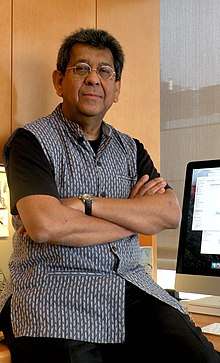Aravinda Chakravarti
Aravinda Chakravarti (born 6 February 1954, Calcutta) is a human geneticist, an expert in computational biology and the 2008 President of the American Society of Human Genetics.[3][4]
Aravinda Chakravarti | |
|---|---|
 Aravinda Chakravarti in 2018 | |
| Born | 6 February 1954 [1] Calcutta, India |
| Alma mater | Indian Statistical Institute University of Texas Health Science Center at Houston |
| Awards | William Allan Award (2013) [2] |
| Scientific career | |
| Fields | Genetics |
| Institutions | Johns Hopkins University School of Medicine Case Western Reserve University University of Pittsburgh The Pennsylvania State University University of Washington |
| Thesis | The Utility of Linked Marker Genes in Genetic Counseling [1] (1979) |
| Website | https://aravindachakravartilab.org |
Early life
Aravinda Chakravarti was born into a family of three sons. Their childhood revolved around the importance of education. He received his Bachelor of Statistics in 1974 from the Indian Statistical Institute in Calcutta. Then moved to the United States in 1979 where he received his Ph.D from the University of Texas.
Research
After receiving his PhD, he then became a member of the Department of Human Genetics at the University of Pittsburgh. In 1994 he began working at the Johns Hopkins University School of Medicine. He is now currently the director of the Center for Complex Disease Genomics of the McKusick-Nathans Institute Medicine. As a professor at the McKusick-Nathans Institute of Genetic Medicine at the Johns Hopkins University of Medicine, he contributed to an editorial titled Genomic Is Not Enough. Throughout this editorial, Chakravarti conveys his goal of making his genetic knowledge be used in medical practice for the use of public and for researchers. However, Chakravarti expresses there is lack of knowledge in how genes affect different diseases. Throughout evolving technology, he has discovered that genomes serve as a marking for our ancestors. Lastly, he discovered that genomic science has provided information about medical treatment for diseases depending on the individuals genes and from their family genes.
Chakravarti's research work has involved the elucidation of the genetics and molecular basis of human disease, primarily complex diseases, and includes both experimental and quantitative (statistical and computational) approaches. This work has, over the past 20 years, focused also on the development and application of numerous genetic and genome–wide tools to questions of human disease etiology.
Chakravarti served since 2000 as director of the McKusick-Nathans Institute of Genetic Medicine at Johns Hopkins University, and since 2007 as director of the Center for Complex Disease Genomics. He became director of the Center For Human Genetics & Genomics at New York University on 2 April 2, 2018.
Awards
- 2013: William Allan Award[2]
- Member of the National Academy of Sciences
In 2013, Aravinda Chakravarti received the award called the William Allan Award. This award is given out each year by the American Society of Genetics to a scientist who has made substantial contributions to understanding human genetics.
Gallery
References
| Wikimedia Commons has media related to Aravinda Chakravarti. |
- "Aravinda Chakravarti: CV".
- "ASHG award winnres: William Allan Award". Archived from the original on 3 October 2014. Retrieved 26 October 2013.
- "Aravinda Chakravarti, PhD: ASHG Past President (2008)". Archived from the original on 6 October 2009. Retrieved 24 November 2009.
- Aravinda Chakravarti Named Head of Genetic Medicine Institute Archived 19 July 2011 at the Wayback Machine

